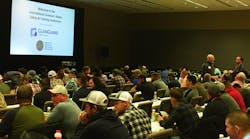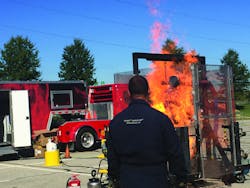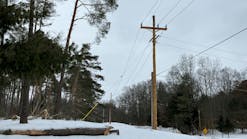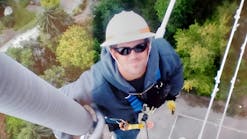As a young journeyman lineman, Thad Adams survived an electrical contact accident. Thirty-five years later, at the age of 66, he has 19 grandchildren, celebrated his 45th wedding anniversary with his wife, Rosemary, and recently retired after a long career in the line trade.
Not all linemen, however, are as fortunate. Between 2003 and 2007, more than 1200 electrical workers were killed by contact with electricity. Forty-three percent of those injuries were caused by contact with overhead lines and 27% were the result of workers coming into contact with wiring, transformers and other electrical components.
"No one can plan on a good result coming from an electrical contact or arc flash," Adams said, as he delivered the keynote address before 300 students, apprentices and journeymen at the 2017 rodeo safety and training conference. "Electricity is unforgiving, and you can’t predict the results in any way, shape or form. Avoidance is the key."
For example, when voltage and current flow entered Adams’ left shoulder and the upper part of his tricep, it exited out of his right leg, causing significant damage.
Shortly thereafter, his wife kept a journal of lessons learned that she never wanted to forget. At the time of the accident, she had four young sons at home, and she says the accident still has a profound impact on her and her family three decades later. "Time has changed me physically, but the feelings, emotions and lessons have remained," she told the audience. "When a terrible accident occurs, so many people are affected. Your life changes in an instant."
While Adams was able to recover from his severe burn injuries and return to work, he says many others in the line trade lose their lives — and their livelihood — as a result of electrical contact. "I was able to return to work, family and life, but no one can count on such a result," Adams said. "While we are all subject to error and can all make mistakes, I plead with you to do your work in the safest way or don’t do it at all. Don’t go through what I went through. Take care of each other, your families, your friends and your coworkers."
Get a Reality Check
By organizing a safety and training conference over the last dozen years, the International Lineman’s Rodeo Association (ILRA) strives to improve linemen’s safety throughout North America. "It keeps getting bigger and better," said Mike Hayward of Empire Electric District. "I’m happy with the way it has grown."
Through its sponsors, including IBEW Local 47 from California, Local 66 from Houston, Local 304 from Topeka, Kansas, and 1464 from Kansas City Power & Light, the ILRA was able to offer free registration to the attendees.
Bobby Christmas, senior executive manager of Guadalupe Valley Electric Cooperative and an ILRA safety committee member, urged the students and apprentices in the room to listen up and pay heed to the safety lessons from the speakers and veteran journeyman linemen attendees at the day-and-a-half conference. "I see a lot of young faces," he said, as he looked out at the entire row of students from a local community college. "Listen to the old guys. They know and have been there, and they’ve seen things and done things. How many times have they been close to meeting their maker? You need to follow the safety rules and the little voice inside of you, or you’re fixin’ to get yourself or someone else hurt."
Discover the Power of Learning Teams
Following the keynote presentation, Stephanie Swindle, maintenance support manager for the Southern Company, shared her story of surviving a hydrogen explosion at a coal plant. "The first blast sucked me in and the second pushed me out," Swindle said. "I ran to my office and put on my hard hat, and when I got all my gear on, I saw a big hole in our building. The operators were covered in coal dust, hanging on to each other and walking around in a fog. When none of the ambulances left, I thought we may have had dead bodies in the building, but by some miracle, an hour later, we confirmed that everyone was OK."
After the incident, she started a personal journey to discover why the incident happened and how to prevent it from happening again. By attending a class, she learned a different way of viewing human performance. "Before, when we had an event, I would gather everyone who had been involved, call them in one at a time and ask them what happened," she said. "Then I would bring in the next person and make him or her sit there, not knowing what would happen and who was telling the truth."
For many years, post-accident investigators have tried to discover which person did something wrong, fill out the paperwork and then move on. This may not be the best approach, however, she says. "We need to get away from the blame game and understand the big story," Swindle said. "The purpose of an investigation should be to prevent reoccurrences, not find people to blame."
To do this, she says it’s beneficial to get the right people in the room and ask them to "share their story." To do this, she says it’s important for the person involved with the accident to personally invite others to join them.
Southern Company is not only conducting these sessions after an accident or incident, but proactively through "learning teams." During these meetings, the participants pin notes on a "Wall of Discovery" board and try to find out ways to improve systems at the utilities. "We’re shifting from the mindset of ‘how did the worker fail the organization to how did the organization fail the worker?’" she said. "We want to make our systems better so even when we have failures, everything will be OK. We want our workers to be able to fail safely."
Prevent Distracted and Drowsy Driving
Along that same vein, two other speakers gave a presentation on how linemen can stay safe in a world inundated with distracted and drowsy drivers. Mike Harp and Steve Kindle from Corporate Safety Compliance say distracted drivers cause more than 3000 deaths and 400,000 injuries annually, yet 67% of drivers continue to use cell phones while driving. Commercial drivers can receive a hefty fine if they’re caught texting or using a cell phone while driving, and if they have an accident, their cell phone records will be investigated, Kindle says.
"We would not likely get into a car with a driver who is drunk or drinking alcohol, but we routinely allow drivers to use cell phones," Kindle said. "Distracted driving is a killer right now, and our job is to not get distracted. If you need to use it, pull over and use the phone."
Using a cell phone slows down a driver’s reaction time and inhibits his or her their ability to make good decisions, Harp says. But drowsy driving is the second cause of car crashes behind drunk driving. "Linemen put in long days, and if they sleep less than five hours, it increases their risk four to five times," Harp said. "It only takes a blink of an eye to change your life forever."
Know Your Rules, Roles and Responsibilities
The safety conference also covered areas such as the importance of following rules and knowing your roles and responsibilities. To that end, Robert Parsons, a retired U.S. Navy chief petty officer, aircraft carrier flight deck coordinator and member of the Blue Angels, compared life in the line trade to working "at the pointy end of the spear" in the military. "Linemen are unsung heroes," said Parsons, who now works as an electrical instrumentation and controls manager for Westar Energy. "People don’t think about what you do every day or thank you, but you help them do their jobs. Their ability to take care of their families depends on you."
Whether in the military or in the civilian world, he says it’s critical to follow operating and maintenance procedures and safety guidelines. "Safety rules are written in blood," he said. "Someone got hurt or killed for that rule to be there."
Christmas says a lot of the safety procedures in the utility industry are modeled after the military. "We need to live safely every minute of the day, whether we are on a Blue Angels team or on a line or trouble truck," he said. "You have to live safely. That’s what keeps us alive."
Mitigate Electrical Contact and Burn Risks
When it comes to the line trade, it’s especially important to work safely because of the dangers of arc flash and electrical contact. To drive that point home, Lucie Martucci of DuPont Protection Solutions educated the attendees about the different materials in garments and how they can affect the amount and degree of burns. "If you don’t know the limitations of your PPE, you need to test it," she said. "If the clothing fabric does ignite and burn, it will increase the extent of the worker’s injury. In fact, more severe burns can be caused by ignited clothing than by the original electric arc flash."
Following her presentation, the attendees were invited outside to see DuPont’s Thermo Man demonstration in the parking lot. DuPont’s team dressed the Thermo Man in cotton undergarments and then layered on different clothing from street clothes to garments offering full flame-retardant protection.
The following day, the ILRA again presented sessions geared towards helping the linemen to make safety an integral part of their job and their lives, Christmas says.
"This year, we focused the conference on the human factor of line work and the need to focus not only on your job, but also your team," Christmas said. "Regardless of what we do, there are processes in place that we need to follow and things we need to learn. By learning and practicing these procedures, we can make things safer for everyone." ♦
Editor’s note: To see a photo gallery from the safety and training conference, visit www.tdworld.com/electric-utility-operations.
Sidebar: Safe Driving in a Distracted World
Corporate Safety Compliance offers three tips to stay safe on the road.
• Plan ahead. Linemen should know their route, check traffic conditions and allow time for eating and grooming before starting up the vehicle.
• Take control. Focus on your driving and not your surroundings, and make a phone call or send a text message when you are pulled over and safely parked.
• Treat each day like there is an opportunity to have an accident. If you are involved in a car crash, the investigators will inspect your cell phone records to determine whether or not you were on the phone or sending a text at the time of the accident.




